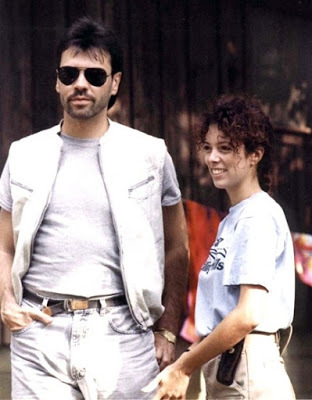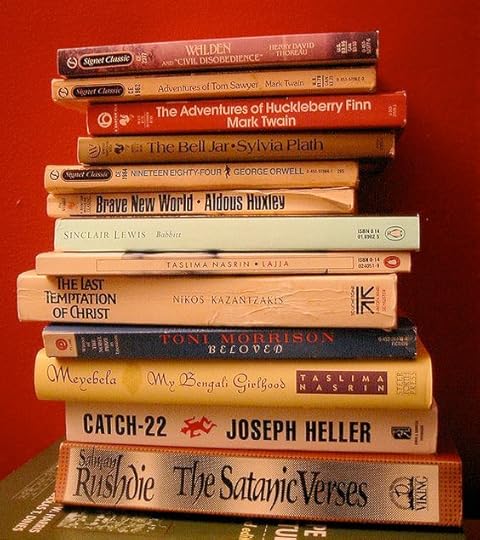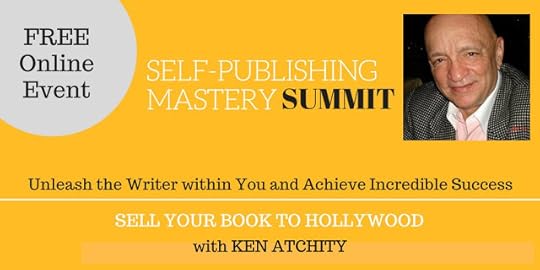Kenneth Atchity's Blog, page 132
September 28, 2017
An Interview With Michael A. Simpson
Published on September 28, 2017 00:00
September 26, 2017
Non-Fiction Book on the Slenderman Controversy From Nick Redfern February, 2018
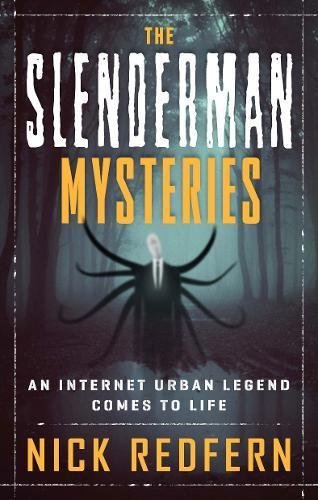 It’s the dead of night; you are fast asleep. Suddenly, you are wide awake but unable to move. Hunched over you in the shadows is an eight- or nine-foot-tall gaunt entity with spider-thin limbs, dressed in an old-style black suit, its pale face missing eyes, nose, ears, and mouth. You finally manage to cry out. The monstrous thing disappears as suddenly as it appeared.
It’s the dead of night; you are fast asleep. Suddenly, you are wide awake but unable to move. Hunched over you in the shadows is an eight- or nine-foot-tall gaunt entity with spider-thin limbs, dressed in an old-style black suit, its pale face missing eyes, nose, ears, and mouth. You finally manage to cry out. The monstrous thing disappears as suddenly as it appeared.You just had a terrifying encounter with the Slenderman.
Who―or what―is the Slenderman? His existence began on the Internet, but he didn’t stay online. The Slenderman may be a tulpa, a thought-form that can stride out of our darkest imaginations and into reality if enough people believe in it. In May 2014, two young Milwaukee girls almost killed a friend in the name of the Slenderman. Perhaps, like the vast Skynet system in the Terminator movies, the Internet is turning against us―and attacking us with digital equivalents of our own online nightmares.
The Slenderman has come to life. For the first time, this book reveals the full and fear-filled saga.

Published on September 26, 2017 00:00
September 25, 2017
Banned Books Week! Read on...
Published on September 25, 2017 12:14
September 22, 2017
What Types of $20M – $50M Films Break Out?
An investigative report from Film Industry Analyst Stephen Follows and Founder of The Numbers Bruce Nash
When we took a look at what it takes for a low-budget film to become a breakout hit, and discovered that the most successful movies came from a small number of specific genres. Twelve months on, we thought it would be interesting to take a look at films at the top end of the “independent” budget range, and see if the hits in this budget range also share some of the same DNA.
To do this, we compiled an analysis of the sixty most profitable movies budgeted between $20 million and $50 million, released between 2000 and 2016: roughly three films a year from the period under consideration. For more details of our methods and criteria, see the Notes section at the end of this piece.
Last time around, we found all the successful films fell into one of four categories. At this higher budget level, things are a little more diverse, but there are still a relatively small number of models that seem to produce the huge hits.
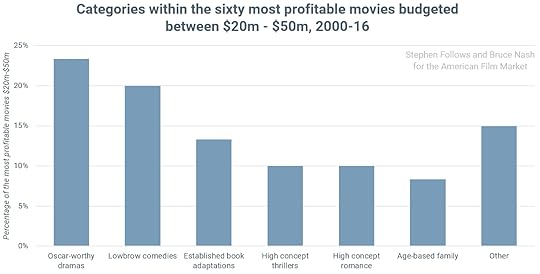
Let’s look a closer look at each of these categories.
Model One: Oscar-Worthy Dramas
Dramas which have been nominated for either Best Picture or a Best Screenplay award at the Academy Awards.Including: The Help, Silver Linings Playbook, The Blind Side, Million Dollar Baby, Finding Neverland, About a Boy, True Grit, Ray, American Hustle, Straight Outta Compton and Bridge of Spies.50% were PG-13, 43% were R-rated and one film was rated PG.
This is the biggest category of films we found, with 14 movies, and the rule here is simple: get a great script, great cast and crew, visionary director, and let them do their thing. Notably, this is the only category that’s a holdover from last year’s study of low-budget films: at all budget levels, quality pays off.
Model Two: Lowbrow Comedies With Broad Appeal
Comedies with a gross-out component and broad appeal.Including: The Hangover, Ted, The 40 Year-Old Virgin, Knocked Up, Bridesmaids, Old School, We’re the Millers, Paul Blart: Mall Cop, Ride Along, Zombieland, Mr. Bean’s Holiday and 21 Jump Street.75% were R-rated.
The general rule among comedies seems to be not to assume too much intellectual capacity from your audience. That’s not to say that these films aren’t well-written (far from it), but there are precious few jokes about Camus or deep themes in these films. All of these films did well at the box office, but they also played well on video—some of them would have made the top 60 anyway, but cranking out big sales and/or rentals on the home market really helped all of them.
Model Three: High Concept Thrillers
Thrillers with a clear, one-line hook.Including: Taken, Lucy, Limitless, District 9, Looper and V for Vendetta.Mostly sci-fi with Taken being the only exception.
The secret for thrillers seems to be to produce something that has a strong “hook,” and then stick to it. Watching the trailer tells you most of what you need to know about these films, perhaps with a bit of a mystery about how they will end (although the Taken films don’t really have much mystery about even that). This is another group of films that benefit from high demand on video.
Model Four: Adaptations of Books With An Established Audience
Based on a highly successful novel, and often produced by a Hollywood major.Including: Twilight, Fifty Shades of Grey, The Notebook, The Maze Runner, Shrek, Hauru no ugoku shiro (Howl’s Moving Castle), Bridge to Terabithia and Dear John.
Although our focus is mostly on independent films, and studio productions tend to exceed $50 million these days, there are a few cases (eight, to be precise) where a studio has bought the rights to a very popular book, managed to keep their budget below $50 million, and made a tidy profit. The common theme here is that the films mostly pleased the existing fans of the books.
Model Five: High Concept romances
Movies targeted almost exclusively at women.Including: The Devil Wears Prada, The Proposal, Bridget Jones’s Diary, Sweet Home Alabama, P.S. I Love You and Serendipity.All but one are PG-13.
This category is something of a counterpart to the thrillers. If that list was the top films that a group of guys might rent on a Friday night, this (along with a few of the book adaptations above) might be the top films for a girls’ night in. Again, a clear hook, interesting female leads and a strong delivery are key.
Model Six: Age-Reversal Family Films
Family films with either adults acting like children or children acting like adults.Including: Elf, Freaky Friday, The Karate Kid, Spy Kids and The Game Plan.All were PG-rated.
We expected to see some family films on this list, but what’s striking about it is that the hook in all but one of them is adults acting like kids or vice versa. Kids seem to love that stuff, and these films not only played well in theaters, but are perennial top-sellers on video. It’s worth noting that Mamma Mia, another movie in a similar vein, misses this list simply because its reported budget was $52 million. Worldwide, it was the top-selling video released in 2008.
AnalysisThe main takeaway from this research is that these types of breakout hits are very clear, high concept movies. They promise the audience one particular thing… and then fully deliver on that pitch. It’s almost like the filmmakers are saying to the audience “We’re not being clever – it’s a film about x”.
Perhaps unsurprisingly, we can see the effect of such simple narratives in the types of people who pay to see these movies. Using UK cinema audience data, we are able to show how the audience differs for four of these major groups.

High Concept Thrillers played to a majority male audience (four-fifths of the audience for Looper were male) and the High Concept Chick Flick played to majority-female audiences (The Devil Wears Prada audience was four-fifths female).
When we focus on Oscar-worthy Dramas and Lowbrow Comedies we can see a clear split, not by gender but by age. All but one of the dramas played to audiences who were, on average, over 25 years old (the one holdout being Silver Linings Playbook). Conversely, all but one of the Lowbrow Comedies played to audiences who were on average under 25 years old, with Bridesmaids being the one exception.
Read more

When we took a look at what it takes for a low-budget film to become a breakout hit, and discovered that the most successful movies came from a small number of specific genres. Twelve months on, we thought it would be interesting to take a look at films at the top end of the “independent” budget range, and see if the hits in this budget range also share some of the same DNA.
To do this, we compiled an analysis of the sixty most profitable movies budgeted between $20 million and $50 million, released between 2000 and 2016: roughly three films a year from the period under consideration. For more details of our methods and criteria, see the Notes section at the end of this piece.
Last time around, we found all the successful films fell into one of four categories. At this higher budget level, things are a little more diverse, but there are still a relatively small number of models that seem to produce the huge hits.

Let’s look a closer look at each of these categories.
Model One: Oscar-Worthy Dramas

Dramas which have been nominated for either Best Picture or a Best Screenplay award at the Academy Awards.Including: The Help, Silver Linings Playbook, The Blind Side, Million Dollar Baby, Finding Neverland, About a Boy, True Grit, Ray, American Hustle, Straight Outta Compton and Bridge of Spies.50% were PG-13, 43% were R-rated and one film was rated PG.
This is the biggest category of films we found, with 14 movies, and the rule here is simple: get a great script, great cast and crew, visionary director, and let them do their thing. Notably, this is the only category that’s a holdover from last year’s study of low-budget films: at all budget levels, quality pays off.
Model Two: Lowbrow Comedies With Broad Appeal

Comedies with a gross-out component and broad appeal.Including: The Hangover, Ted, The 40 Year-Old Virgin, Knocked Up, Bridesmaids, Old School, We’re the Millers, Paul Blart: Mall Cop, Ride Along, Zombieland, Mr. Bean’s Holiday and 21 Jump Street.75% were R-rated.
The general rule among comedies seems to be not to assume too much intellectual capacity from your audience. That’s not to say that these films aren’t well-written (far from it), but there are precious few jokes about Camus or deep themes in these films. All of these films did well at the box office, but they also played well on video—some of them would have made the top 60 anyway, but cranking out big sales and/or rentals on the home market really helped all of them.
Model Three: High Concept Thrillers

Thrillers with a clear, one-line hook.Including: Taken, Lucy, Limitless, District 9, Looper and V for Vendetta.Mostly sci-fi with Taken being the only exception.
The secret for thrillers seems to be to produce something that has a strong “hook,” and then stick to it. Watching the trailer tells you most of what you need to know about these films, perhaps with a bit of a mystery about how they will end (although the Taken films don’t really have much mystery about even that). This is another group of films that benefit from high demand on video.
Model Four: Adaptations of Books With An Established Audience

Based on a highly successful novel, and often produced by a Hollywood major.Including: Twilight, Fifty Shades of Grey, The Notebook, The Maze Runner, Shrek, Hauru no ugoku shiro (Howl’s Moving Castle), Bridge to Terabithia and Dear John.
Although our focus is mostly on independent films, and studio productions tend to exceed $50 million these days, there are a few cases (eight, to be precise) where a studio has bought the rights to a very popular book, managed to keep their budget below $50 million, and made a tidy profit. The common theme here is that the films mostly pleased the existing fans of the books.
Model Five: High Concept romances

Movies targeted almost exclusively at women.Including: The Devil Wears Prada, The Proposal, Bridget Jones’s Diary, Sweet Home Alabama, P.S. I Love You and Serendipity.All but one are PG-13.
This category is something of a counterpart to the thrillers. If that list was the top films that a group of guys might rent on a Friday night, this (along with a few of the book adaptations above) might be the top films for a girls’ night in. Again, a clear hook, interesting female leads and a strong delivery are key.
Model Six: Age-Reversal Family Films

Family films with either adults acting like children or children acting like adults.Including: Elf, Freaky Friday, The Karate Kid, Spy Kids and The Game Plan.All were PG-rated.
We expected to see some family films on this list, but what’s striking about it is that the hook in all but one of them is adults acting like kids or vice versa. Kids seem to love that stuff, and these films not only played well in theaters, but are perennial top-sellers on video. It’s worth noting that Mamma Mia, another movie in a similar vein, misses this list simply because its reported budget was $52 million. Worldwide, it was the top-selling video released in 2008.
AnalysisThe main takeaway from this research is that these types of breakout hits are very clear, high concept movies. They promise the audience one particular thing… and then fully deliver on that pitch. It’s almost like the filmmakers are saying to the audience “We’re not being clever – it’s a film about x”.
Perhaps unsurprisingly, we can see the effect of such simple narratives in the types of people who pay to see these movies. Using UK cinema audience data, we are able to show how the audience differs for four of these major groups.

High Concept Thrillers played to a majority male audience (four-fifths of the audience for Looper were male) and the High Concept Chick Flick played to majority-female audiences (The Devil Wears Prada audience was four-fifths female).
When we focus on Oscar-worthy Dramas and Lowbrow Comedies we can see a clear split, not by gender but by age. All but one of the dramas played to audiences who were, on average, over 25 years old (the one holdout being Silver Linings Playbook). Conversely, all but one of the Lowbrow Comedies played to audiences who were on average under 25 years old, with Bridesmaids being the one exception.
Read more

Published on September 22, 2017 00:00
TROPHY Q&A Opening Night at the Monicas with Filmmakers, Subject, and Moderator Alec Baldwin
TROPHY deeply troubling and controversial. Screening hosted by Alec Baldwin and welcoming filmmakers Shaul Schwarz and Christina Clusiau along with John and Albina Hume.
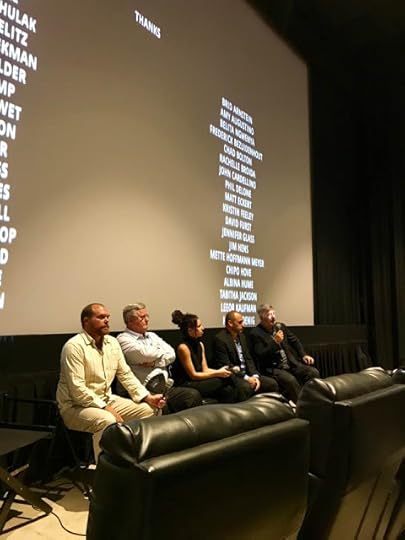

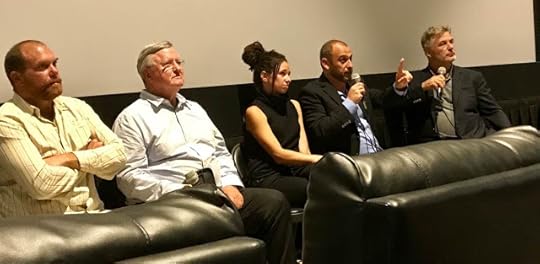





Published on September 22, 2017 00:00
September 20, 2017
Faith, Fiction, Friends Reviews Michael A. Simpson's "Sons of My Fathers"

This is a story of one family and two wars separated by 100 years. The two wars happen to be the most divisive in American history – the Civil War of 1861-1865 and the Vietnam War which ended in 1975, but began either in the 1950s or the 1960s. It is a novel, but it is a novel so based on historical and real family events that it could almost be non-fiction. One of the main characters is actually the author.Welcome to Sons of My Father by Michael Simpson.Simpson tells two stories in this book. One is set largely in 1864, when Simpson’s small farmer ancestors (they were not slave owners) find the entire family caught up in the Civil War as both soldiers and non-combatants. After capturing Chattanooga, General William Tecumseh Sherman’s Union army is advancing on Atlanta.
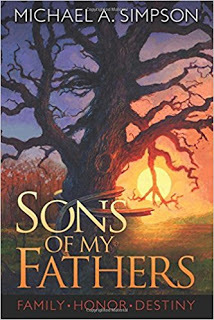 The countryside is in chaos – advance Union patrols, retreating Confederate soldiers, roaming bands of deserters and even criminals. Baylis Simpson has four sons fighting for the South and a daughter, son, and granddaughter at home. A band of deserters or criminals happens upon the two girls; the daughter is raped and the granddaughter is murdered. Baylis, on leave from the Georgia Home Guard for planting, tracks them down, and exacts revenge, the rapist meeting a particularly gruesome death. Baylis and one of his sons will then find their army units and discover themselves at the Battle of Kennesaw Mountain, the last hurdle before Sherman can take Atlanta.This is the South in the Civil War. Lawlessness everywhere, law and order breaking down, farms often stripped of anything edible and women and children left to starve.The second story starts in the early 1960s. Three boys – Alex Granger, Ron Simpson, and Ron’s younger brother Michael – are the closest of friends. Alex grows up with the Simpsons almost as a member of the family. His own father is dead and Ron and Michael’s father Harold, a veteran World War II Marine, helps to raise him. The boys get into the kinds of pranks and escapades that boys often did in the 1960s. But as Alex and Ron graduate from high school, they decide to enlist in the Army. And what’s hanging over both of them is the Vietnam War.
The countryside is in chaos – advance Union patrols, retreating Confederate soldiers, roaming bands of deserters and even criminals. Baylis Simpson has four sons fighting for the South and a daughter, son, and granddaughter at home. A band of deserters or criminals happens upon the two girls; the daughter is raped and the granddaughter is murdered. Baylis, on leave from the Georgia Home Guard for planting, tracks them down, and exacts revenge, the rapist meeting a particularly gruesome death. Baylis and one of his sons will then find their army units and discover themselves at the Battle of Kennesaw Mountain, the last hurdle before Sherman can take Atlanta.This is the South in the Civil War. Lawlessness everywhere, law and order breaking down, farms often stripped of anything edible and women and children left to starve.The second story starts in the early 1960s. Three boys – Alex Granger, Ron Simpson, and Ron’s younger brother Michael – are the closest of friends. Alex grows up with the Simpsons almost as a member of the family. His own father is dead and Ron and Michael’s father Harold, a veteran World War II Marine, helps to raise him. The boys get into the kinds of pranks and escapades that boys often did in the 1960s. But as Alex and Ron graduate from high school, they decide to enlist in the Army. And what’s hanging over both of them is the Vietnam War.
 Michael SimpsonMoving back and forth between the two narratives, Simpson paints a picture of the effects of war, the divisiveness of war, and the tremendous stresses that families experience in wartime. He also paints a picture of what happens when a highly trained helicopter pilot, understanding what happened with the My Lai Massacre, decides he can’t participate in the killing of the enemy. (This is based on a historical situation involving Ron Simpson, one that went to trial in federal court in Atlanta.)Michael Simpson is a screenwriter, director, and producer of documentaries and feature films. His credits include the movies “Crazy Heart” and “Kidnaping Mr. Heineken” among many others. This is his first novel. Sons of My Fathers is gripping, moving, and eye-opening. It tells the story of how the idea of duty and honor infuses families down through the generations. And it tells what happens when duty and honor collide with conscience.
Michael SimpsonMoving back and forth between the two narratives, Simpson paints a picture of the effects of war, the divisiveness of war, and the tremendous stresses that families experience in wartime. He also paints a picture of what happens when a highly trained helicopter pilot, understanding what happened with the My Lai Massacre, decides he can’t participate in the killing of the enemy. (This is based on a historical situation involving Ron Simpson, one that went to trial in federal court in Atlanta.)Michael Simpson is a screenwriter, director, and producer of documentaries and feature films. His credits include the movies “Crazy Heart” and “Kidnaping Mr. Heineken” among many others. This is his first novel. Sons of My Fathers is gripping, moving, and eye-opening. It tells the story of how the idea of duty and honor infuses families down through the generations. And it tells what happens when duty and honor collide with conscience. Photograph: A Monument to Illinois soldiers who fought at Cheatham Hill, also known as the Dead Angle, the location where Simpson’s Confederate ancestors helped to hold off the Union Army advance for five days.
Read more

Published on September 20, 2017 00:00
September 18, 2017
Writers Check Out Dennis Palumbo's Article "Rejection" in Suspense Magazine
Published on September 18, 2017 00:00
September 15, 2017
September 16, 2017 Self-Publishing Mastery Summit Online Day 2 With Ken Atchity Sell Your Book to Hollywood!
Published on September 15, 2017 17:24
72-hour FREE access to SELF-PUBLISHING MASTERY SUMMIT ONLINE Videos!
SELF-PUBLISHING MASTERY SUMMIT ONLINE

Today's sessions will:get you one step closer to your writing goals,help you master the self-publishing process, teach you the best marketing strategies and tactics that will boost sales and visibility, take you through a step-by-step process of launching your book with 100+ Amazon reviews,show you how to write an award-winning book.
For the next 72 hours, the access to our event is FREE. However, if you want permanent access to the videos and mp3s - yes, you will be able to listen to the interviews during your commute or when you exercise on the treadmill, after the 72-hour FREE access then I recommend grabbing the ALL ACCESS PASS. You can still get it today at a huge (50%) discount! Press here for your instant access to the ALL ACCESS PASS . Only $59 (instead of $119).

Published on September 15, 2017 17:15
More Story Merchant Books September Amazon eBook Deals!
 FREE September 16 - September 20!
FREE September 16 - September 20!Texas Hard by Echo Enders
In the midst of her emotional trip Adrienne meets two ranch hands and both have a lot to offer a girl but trusting the wrong man could surely spell trouble.
For Adrienne Carl, Miami is home, but jumping across the Gulf to visit family in Texas is usually a treat. Until her uncle dies unexpectedly, mysteriously, and she’s left as executor.
In the midst of her emotional trip she meets two ranch hands that worked for her uncle, Lane, and both have a lot to offer a girl. One promises to be a fantastic lay and reliever of stress; the other offers the to be the "hard to handle" cowboy fantasy of her dreams. Both are powerful and dangerous, handsome and built, and not at all shy about what they pack, but what to do…better yet, who to do?
www.amazon.com/dp/B00TKM8BUU
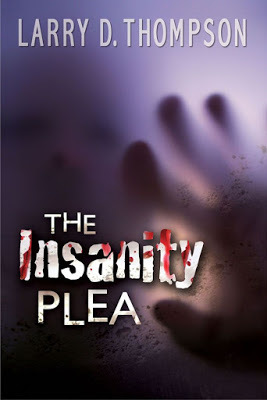 FREE September 19 - September 23
FREE September 19 - September 23Larry D. Thompson’s The Insanity Plea
A spell-binding tale of four amateur sleuths who must find, track and trap a serial killer before the clock clicks down to a guilty verdict for an innocent man.
A young nurse is savagely killed on Galveston’s seawall. The murderer slices her running shorts from her body as his trophy and tosses her over the wall to the rocks below.
As dawn breaks, a bedraggled street person, wearing four layers of old, tattered clothes, emerges from the end of the jetty, waving his arms and talking to people only he hears. He trips over the body, checks for a pulse and, instead, finds a diamond bracelet which he puts in his pocket. He hurries across the street, heading for breakfast at the Salvation Army two blocks away, leaving his footprints in blood as he goes.
www.amazon.com/dp/B00K60LZE4
 FREE September 22 - September 26!
FREE September 22 - September 26!Kenneth Atchity’s Classical Greek Reader
Scholarly commentary on the nuances of Greek writing fills library shelves, even entire libraries. Yet nothing can take the place of the documents themselves. The Classical Greek Reader marks an exciting departure from the traditional anthology approach to Greek literature and thought. By focusing not only on the big names but also on the less-familiar voices--the women, doctors, storytellers, herbalists, and romance writers--we are offered a glimpse of ancient Greece as we have rarely seen it.
www.amazon.com/dp/B00ONXTPSI
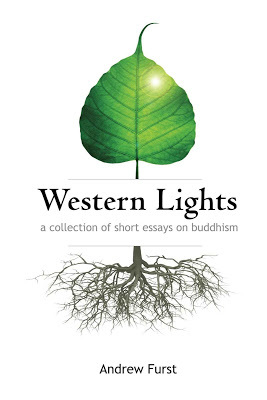 FREE September 25 - September 29
FREE September 25 - September 29Western Lights by Andrew Furst
Western Lights is a collection of essays from the viewpoint of a Western Buddhist teacher. It speaks about Eastern concepts like karma, hope, attachment, and amptiness from a personal perspective and in terms familiar to Americans. They’re grounded in subject matter familiar to Americans like politics, science, psychology, heaven, and nature.
www.amazon.com/dp/B00KTO9XJ6

Published on September 15, 2017 00:00

